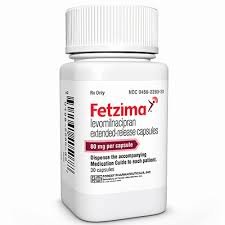What is Fetzima?
Fetzima
Get Now
Mechanism of Action
Fetzima functions by inhibiting the reuptake of two key neurotransmitters: serotonin and norepinephrine. By increasing the availability of these chemicals in the brain, Fetzima helps to improve mood and alleviate symptoms of depression. The dual action of affecting both serotonin and norepinephrine is thought to provide a broader therapeutic effect compared to selective serotonin reuptake inhibitors (SSRIs), which primarily focus on serotonin.
Indications
Fetzima is primarily indicate for the treatment of major depressive disorder in adults. It may be prescribed when other antidepressants have been ineffective or if the patient has not respond to standard therapies. It is important to note that Fetzima is not approved for use in children or adolescents.
Dosage and Administration
Fetzima is typically take once daily, with or without food. The starting dose is usually 40 mg, which may be adjust base on the patient’s response and tolerance, with a maximum dose generally cappy at 120 mg per day. It’s crucial for patients to follow their healthcare provider’s instructions regarding dosage and to communicate any concerns or side effects experienced during treatment.
Potential Side Effects
Like all medications, Fetzima may cause side effects. Common side effects include:
- Nausea
- Constipation
- Sweating
- Increased heart rate
- Dry mouth
- Insomnia
While many side effects are mild and may improve over time, patients should be aware of more serious risks, such as:
- Elevated blood pressure
- Serotonin syndrome (a rare but potentially life-threatening condition caused by excess serotonin)
- Suicidal thoughts or behaviors, especially in younger populations
Patients are encourage to seek immediate medical attention if they experience severe side effects or symptoms of an allergic reaction.
Precautions and Contraindications
Before starting Fetzima, it is important for patients to discuss their medical history with their healthcare provider, particularly any history of heart conditions, high blood pressure, or liver problems. Fetzima should not be take in conjunction with monoamine oxidase inhibitors (MAOIs) or within 14 days of stopping an MAOI due to the risk of severe interactions.
Conclusion
Fetzima can be an effective option for individuals struggling with major depressive disorder, particularly when other treatments have not yielded satisfactory results. However, as with any medication, it is essential for patients to have open and ongoing discussions with their healthcare providers to ensure safe and effective treatment. Understanding the potential benefits and risks associated with Fetzima is key to making informed decisions about mental health care.



